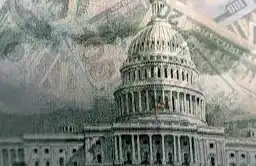Will Trump's announced $2000 "Tariff Bonus" really bring about a liquidity feast?
Original Article Title: "A $2000 Christmas 'Heist': Trump and His Tariff Dividend"
Original Source: Chainalysis
Every Christmas, children receive a gift from a mysterious old man, never questioning the cost of the gift. Now, Donald Trump is trying to play Santa Claus for the adult world, promising to distribute a sky-fallen $2000 "tariff dividend" and claiming the gift is paid for by a distant "foreign factory." The crypto market is already excited like a group of eager children unwrapping gifts. But there is an overlooked detail in this grand magical performance: Before applauding for the rabbit that appeared out of thin air, no one asked who swapped their dinner for it. And who will go hungry tonight?
I. When the President Announces National Cash Giveaway: A Market's Celebration

Source: Donald Trump
And the crypto market happens to be the diner who never cares about who pays for dinner, only smelling the aroma.
The last time they reveled was during the pandemic stimulus check; this time, the feast's main course has been replaced with Donald Trump's new twist - the "Tariff Dividend." This 79-year-old "Santa Claus" who hastily "took office" more than a month early, officially announced on November 9 on his social platform Truth Social that he would distribute $2000 cash to every low- and middle-income American. And the "magic" producing this money is not from a traditional printing press but from his beloved import tariffs.
The market's applause roared without hesitation. Within minutes of the announcement, Bitcoin surged by 1.75%, Ethereum rose by 3.32%. Privacy coins more sensitive to the "anonymous cash giveaway" narrative, such as Zcash and Monero, recorded double-digit insane gains. Cryptocurrency exchange volumes skyrocketed, and the cheers of a "new stimulus bull market" on social media were incessant.
Clearly, for this excited "children," Santa Claus has already set off on his sleigh.
An Early Unwrapped Gift Box: The Source of the Dividend
Trump's obsession with tariffs can be traced back to his 2016 campaign promise of "America First."
He firmly believes that high tariffs can protect American manufacturing and make foreign countries foot the bill for America's debt. After taking office, he quickly launched trade wars with economic entities such as China and the EU, imposing high tariffs on imported steel, aluminum, and consumer goods.
This logic is simple yet dangerous: tariffs are described as a "protection fee" paid by foreign countries, rather than an implicit tax burden on American consumers.
By the 2025 fiscal year, U.S. tariff revenue reached as high as $195 billion. Trump has repeatedly claimed that this revenue could be used to pay off America's $37 trillion national debt. However, economists point out that businesses simply pass on the costs to consumers, resulting in rising inflation and reduced purchasing power.
However, in the eyes of Trump's supporters, this is a victory—tariffs make "foreign countries pay, and America get richer." This narrative has laid the political groundwork for his proposed "tariff dividend."
How was the dividend born?
The concept of the "tariff dividend" did not appear out of thin air, in a TV interview last month. Trump hinted at plans to return a portion of tariff revenue to Americans—ranging from $1,000 to $2,000 per person. He claimed that this policy could generate over $1 trillion in revenue annually, enough to cover a national dividend.
On November 9, he officially announced the plan on Truth Social: "We are collecting trillions of dollars and will soon start paying off our massive debt. Everyone (excluding the wealthy!) will receive at least $2,000 in dividends."
Treasury Secretary Scott Bessent later hinted that the dividend might be distributed in the form of tax cuts. However, Trump did not provide specific details.
In other words, this shiny gift box is opened to reveal emptiness. There is no timetable, no eligibility criteria, and certainly no nod from Congress.

And according to an analysis by Kobeissi Letter's investment analyst, referencing the distribution pattern of stimulus checks during past pandemics, approximately 220 million American adults currently qualify to receive this stimulus check. In form, this sounds like a "fiscal innovation"; in substance, it is a replay of a political script. First, chant slogans, then stimulate market response.
Formally, this sounds like a "financial innovation"; in substance, it's a replay of a political script. Start with slogans, stimulate the market reaction.
The market has muscle memory. It vividly remembers 2020, when stimulus checks from the U.S. government sent Bitcoin soaring from $4,000 to $69,000, marking the most fervent bull run in crypto history. The market naturally expects a "historical replay", opening the wildest party in crypto history. Now, the familiar music plays again, and the market naturally expects a "historical replay".
But this time, the magician's trick has a flaw: the party back then was fueled by the Fed conjuring fine wine out of thin air; whereas today's "bonus" just redistributes some guests' wine to others. It's not a new feast, merely a tax maneuver. Its scale and sustainability are both filled with question marks.

After the last round of stimulus measures, the U.S. inflation rate approached 10%.
II. The Prelude of Advance Celebration and the Unpaid Bill: Emotion, Revelry, Illusion
Short-Term Market Hype: Emotion First, Cash Later
The crypto market always reacts swiftly to a narrative.
Within 24 hours of the announcement, mainstream cryptocurrencies such as Bitcoin, Ethereum, Solana, all surged.
"Stocks and Bitcoin only respond to stimulus in one way — up. Investor Anthony Pompliano wrote on his personal X platform after the announcement.
Bitcoin advocate Simon Dixon reminded: "If you don't invest this $2,000 into assets, it will either be swallowed by inflation, used to pay off debts, and eventually flow back to the bank."
This statement reveals the core market psychology: regardless of whether the stimulus actually materializes, liquidity expectations are the fuel for price increases.
But this surge is more like a psychological speculation illusion.
1. Firstly, this policy has not yet received any legislative authorization. If the Supreme Court rules the related tariffs illegal, the bonus plan may be stillborn.
2. Second, even if implemented, it implies direct distribution of fiscal revenue rather than debt reduction. Trump's promise of "repaying U.S. debt with foreign money" is likely to once again fall through.
3. More importantly, large-scale cash handouts will increase inflationary pressure, forcing the Federal Reserve to adopt a more hawkish monetary policy. At that time, liquidity will tighten, and risk assets will be the first to bear the brunt.
Industry investment analysts have warned that although some of the dividend funds will flow into the market to boost asset prices, the long-term consequences will be fiat inflation and loss of purchasing power.

Game of Predicting Markets: Kalshi vs. Polymarket
Behind the frenzy, a legal battle is underway. The U.S. Supreme Court is currently hearing a case on the legality of tariffs. As of the time of writing before November 10, according to the decentralized prediction market Polymarket's data, traders give only a 23% probability of Supreme Court approval; on the prediction platform Kalshi, this number is even lower, at 22%. In other words, the majority of the market is betting that the plan will ultimately face judicial rejection.

Source: Polymarket
But Trump himself is evidently a more outstanding "drama director." He directly asked on Truth Social:
"The U.S. president is authorized by Congress to stop all trade with foreign countries—which is far more severe than imposing tariffs—but cannot tax for national security purposes? What kind of logic is that?"
See, with just one sentence, he ingeniously reshaped a dull dispute into a political drama about "sovereignty."
This dramatic strategy, for someone who once made a cameo in the Christmas classic movie "Home Alone 2," directing the little protagonist on how to find the lobby, is simply second nature.
Three. The Tooth Decay Named "Inflation" Behind Christmas Candy
In other words, behind the short-term revelry is a familiar script, the director remains the same, only passing the problem on to the next actor.
The "Tariff Dividend" has been carefully packaged as a Christmas gift box, but it's more like a piece of instant-melting Christmas candy, where after the sweet taste (short-term stimulus), all that's left is the "inflation" — an incurable cavity.
1. The $195 billion in revenue from tariffs, when compared to the $37 trillion national debt, is like trying to fill a swimming pool with a single coin. Sending this coin straight into circulation is akin to using future money to pay for current cheers.
2. What short-term political popularity brings is long-term fiscal peril. Economists warn that this policy could lead to a "double inflation": tariffs raise costs, the dividend stimulates demand, similar to pressing both the gas and brake pedals of an already speeding car, ultimately resulting in an overheated engine and a fatal crash.
3. The geopolitical aspect is equally important to consider. This noisy family party may also attract complaints or even retaliation from neighbors (other countries). As the snowball effect of a trade war resumes, the global supply chain's windows will rattle, especially for the cryptocurrency mining industry reliant on global chips, this is nothing short of a blizzard.
In other words, behind the short-term revelry lies a familiar script. Santa Claus merely stuffed a bill labeled "inflation," "deficit," and "trade war" into next year's Christmas stocking.
Five, The Last One to Leave the Table

In this grand political drama, Santa Trump has prepared a special gift not only for the ordinary people but also for the crypto world. When he announced that he would pull out $2000 from that only pocket named "Tariff" for each American, the entire crypto market seemed to have heard the Christmas Eve chimes in advance.
Nowadays, the sleigh of history seems to be following its old path. The children in the market (retail investors) are eagerly watching the chimney, believing that some gifts will drop directly into their crypto wallets, ushering in another "altseason."
However, every child who believes in Santa will eventually face a harsh reality: what is the cost of the gift?
This time, Santa's gift didn't magically appear in the workshop at the North Pole; he just generously maxed out the nation's credit card. This feast totaling over $400 billion comes with a bill known as "inflation." When the heat of the holiday season makes the whole room (economy) overheated, the adults (The Fed) may have to open the windows and let in the cold breeze (raise rates), bringing this celebration to an early close.
So, what lies before every crypto investor is a beautifully wrapped gift box. In the short term, it shines with the enticing luster of history repeating itself; but in the long term, the back of the box may feature a small-print "inflation" bill.
Is this truly a gift that can keep the entire winter warm, or is it a Christmas candy that melts in your mouth but leaves you with a cavity? For the believers in the crypto world, choosing which story to believe in will determine whether they can walk away unscathed from this feast.
The last one to leave the party pays the bill.
Welcome to join the official BlockBeats community:
Telegram Subscription Group: https://t.me/theblockbeats
Telegram Discussion Group: https://t.me/BlockBeats_App
Official Twitter Account: https://twitter.com/BlockBeatsAsia


 Forum
Forum Finance
Finance
 Specials
Specials
 On-chain Eco
On-chain Eco
 Entry
Entry
 Podcasts
Podcasts
 Activities
Activities
 OPRR
OPRR








